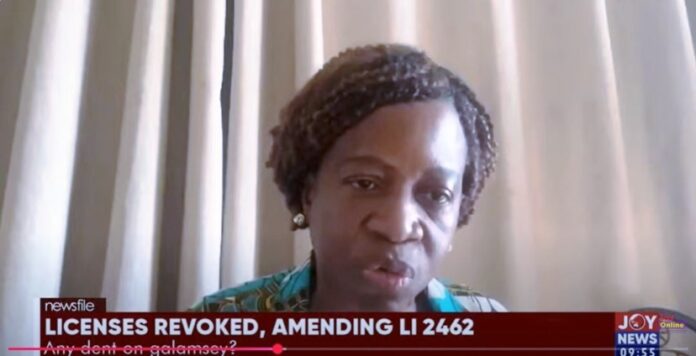The Coordinator of Eco-Conscious Citizens, Awula Serwah, has criticised the government’s approach of deporting foreign nationals involved in illegal mining activities without subjecting them to prosecution and sentencing.
Her comments follow the government’s decision to deport, rather than prosecute, foreign nationals caught engaging in illegal mining, popularly known as galamsey.
Deputy Interior Minister Ebenezer Terlarbi has admitted that Ghana’s criminal justice and prison systems are so overwhelmed that the government is unable to effectively prosecute and detain foreign nationals involved in illegal mining.
In an interview on Joy FM’s Middaynews on Wednesday, April 9, Madam Serwah described the practice as unjust, ineffective, and a dangerous signal that Ghana is soft on environmental crime.
According to her, allowing foreigners to destroy Ghana’s forest reserves and poison water bodies only to send them back to their home countries without any sanctions amounts to rewarding criminal behaviour.
“The law is the law, and we must go by it. It is astonishing that foreigners can come into Ghana, commit ecocide — destroying our forests and polluting our rivers — and all we do is pay for their flight tickets and send them home without trial. Meanwhile, Ghanaian offenders are jailed,” she stated.
She described this double standard as discriminatory and counterproductive, noting that it fails to serve as a deterrent and rather encourages more foreign nationals to engage in illegal mining.
“If we truly understand that illegal mining is an existential threat to our environment and future, then justice must be applied equally. Deporting them without prosecution is not justice — it’s an incentive for others to come and do the same,” she added.
Madam Serwah further argued that if Ghana’s prisons are full, the solution is not to bypass the law but to think innovatively, including setting up temporary holding facilities if necessary.
“We’ve seen it before with the Aisha Huang case — deportation did not stop her from returning and continuing her illegal activities. So there’s no guarantee that just by deporting them, they are solving the problem… What we are saying is that prosecute them, sentence them, and find ways of containing them. Deporting them without serving a sentence is not a deterrent. You’re actually encouraging more non-Ghanaians to come and poison our water bodies and destroy our forest reserves,” she concluded.

